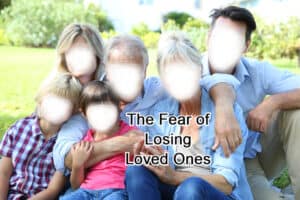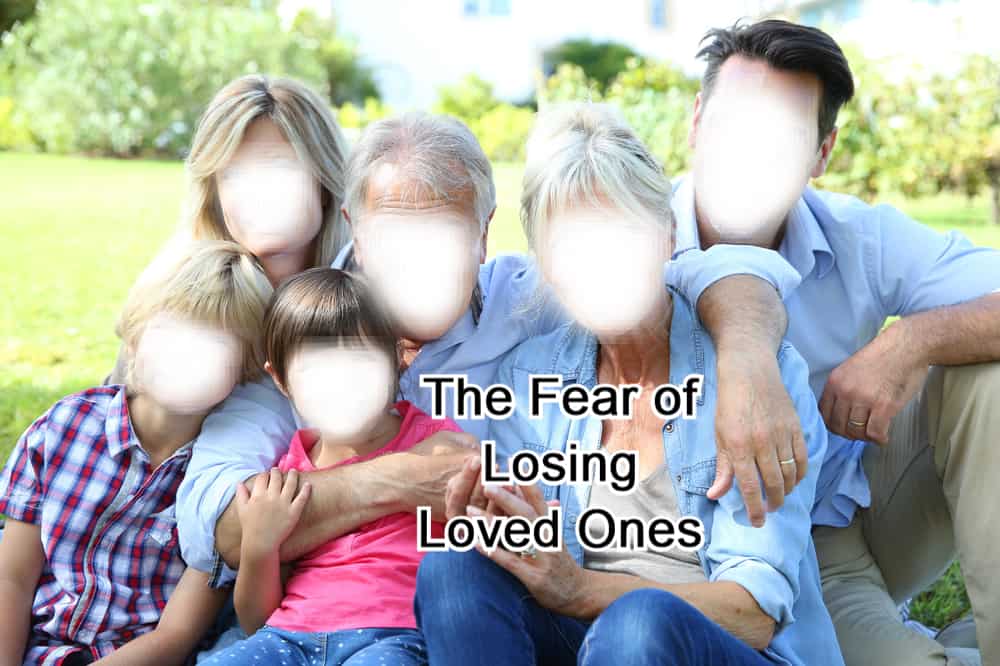Share This Article
The Excessive Fear of Losing Loved Ones
Do you find yourself avoiding talk of death, making wills, discussing loved ones in the hospital, or anything related to the end of life? Are you constantly worried about losing someone you love? Does the thought of being ill or finding out someone you love is ill send chills down your spine?
If so, you may be dealing with the excessive fear of losing loved ones.
Suffering from this fear means you constantly worry about your well-being or the well-being of loved ones, especially if they are sick or suffering.
Living with such a phobia can be challenging, since you may tend to worry about the smallest things. People suffering from the excessive fear of losing people close to them tend to avoid sharing their feelings. They fear others will assume they’re overthinking or are a worrier.
The good news is that this excessive fear can be treated. So, here’s an in-depth exploration of what this phobia involves and how you can overcome it.
What Is the Excessive Fear of Losing Loved Ones?
The fear of losing someone may seem like a normal reaction to death. After all, many of us are concerned about the end of life. However, some people have an exaggerated or excessive fear of losing loved ones. When this fear begins to impact one’s day-to-day life, it becomes a problem.
The constant fear of loved ones dying is a phobia all its own. It’s related to thanatophobia, the fear of death, and is one of the most common among all the phobias. A person suffering from the fear of loved ones dying cannot stop thinking about the finality of death and is constantly worried about the health of loved ones.
Those struggling with this phobia may be reluctant to do activities with high-risk factors such as going to an amusement park, on a hike, or to the beach. Some may even shadow loved ones as a means of protection. Others may experience extreme anxiety about family members dying and may even have panic attacks at the thought of their own death.
This excessive fear may also lead to hypochondriasis, which is a chronic mental illness where the person fears developing a life-threatening illness even though there are no symptoms.

Causes of Excessive Fear of Losing Loved Ones
So, what causes the fear of losing your friends and loved ones? Like all other anxiety-related phobias, the exact cause of this excessive fear is unknown.
However, there are several reasons that may play a part in the development of this phobia.
Childhood Trauma
A childhood experience involving the death of a loved one can cause one to develop a phobia of death. Dealing with the loss of a loved one is never easy, especially at a young age. Such a traumatic experience can make one fragile, both emotionally and mentally. If proper care and attention is not received at this phase, a phobia may develop.
Witnessing someone go through a painful death can also instill a fear of death. It’s natural that a child would not wish the pain of death for themselves or their loved ones.
Role of Religion
A person’s religious beliefs often define how they perceive the end of life. If one believes that their “sins” in this world will condemn them eternally, then they may fear death.
Environment
Phobias can also be a learned behavior. If a person is surrounded by someone who also has the fear of death, they, too, can develop the same or similar phobia.
Genetic Predisposition
Having a genetic history of mental issues, especially anxiety disorders, makes a person more susceptible to developing a phobia. In these cases, the risk is higher since even the slightest cues can lead to the onset of the phobia.
Age and Chronic Illness
Middle-aged people and those suffering from chronic illness are more likely to develop this death phobia. They may witness the death of near-age friends and relatives and may be experiencing pain and suffering themselves due to illness.
Excessive Fear Symptoms
A person suffering from the excessive fear of losing loved ones may experience a few or more of the following symptoms.
Physical Symptoms
- Sweating
- Increase in blood pressure
- Shivering
- Palpitations
- Increased heart rate
- Nausea
- Headache
- Vomiting
- Dizziness
- Shortness of breath
Mental/Emotional Symptoms
- Anxiety
- Panic attacks
- Fearing death
- Obsessive-compulsive disorder
- Illness anxiety disorder
Possible Treatments for Excessive Fear of Losing Loved Ones
Now that we know the causes and symptoms of this excessive fear, let’s learn how to stop thinking about death of loved ones or one’s own mortality.
Like all other anxiety disorders, there is no defined treatment for the fear of losing loved ones. However, there are certain treatment plans you can follow to better cope with your fear or perhaps even overcome it.
Self-Help
Self-help is one of the best ways to deal with fear of losing loved ones. You can try various self-help techniques such as journaling, meditation, exposure therapy, relaxation techniques, exercising, etc. Practicing these techniques can calm you and help you think more rationally.
You can also make a list of all things that concern you, your triggers, stressors, and more. You can also journal your thoughts and improvements. Additionally, you can learn about death and dying and join support groups that will help you understand your condition better.
Professional Help
Medical practitioners are experts in the field of treating phobias and are better equipped to help you deal with the fear. They can assess your situation accurately and recommend the best treatment plan for you.
Some of the treatment plans a therapist may use are:
- Talk therapy
- Cognitive behavioral therapy (CBT)
- Exposure therapy
Medications
In rare cases, if the patient is having repeated panic attacks and immediate action is needed, the doctor may prescribe antidepressants or anti-anxiety medications. These help reduce the symptoms, but they are not a cure for the phobia itself.
Once the patient is stabilized, a health care professional may discontinue use of medication and rely on other methods of therapy alone.
Conclusion
The death of a loved one can cause extreme anxiety, no matter the relationship. People suffering from this phobia can find it difficult to go about their day-to-day lives, which affects their normal functioning in society.
However, with proper care, you can leave behind this fear and live a happy and fulfilling life.
SOURCES:
https://www.verywellhealth.com/thanatophobia-5192097
https://www.verywellmind.com/thanatophobia-2671879#toc-what-does-thanatophobia-feel-like
https://my.clevelandclinic.org/health/diseases/22830-thanatophobia-fear-of-death#
https://www.healthline.com/health/thanatophobia#treatment
https://www.harleytherapy.co.uk/counselling/fear-of-losing-loved-ones.htm
https://www.medicalnewstoday.com/articles/321939#symptoms-and-diagnosis



